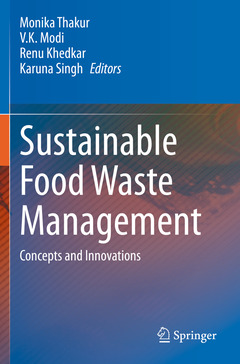Description
Sustainable Food Waste Management, 1st ed. 2020
Concepts and Innovations
Language: English
Subjects for Sustainable Food Waste Management:
Publication date: 01-2022
413 p. · 15.5x23.5 cm · Paperback
Publication date: 01-2021
413 p. · 15.5x23.5 cm · Hardback
Description
/li>Contents
/li>Biography
/li>Comment
/li>
This book discusses one of the biggest challenges of the food industry, which is waste management. Food industries generate high amounts of waste, both solid and liquid, resulting from the production, processing and consumption of food. Stringent environmental legislators have made the task of waste management more challenging. Through the three sections of this book, the readers are introduced to the different types of wastes generated, utilization of waste through food processing industry and sustainable waste management technologies. The different chapters describe how the biomass and the valuable nutrients from food industry wastes could be used to develop value-added products. The book reiterates that food wastes and their by-products are an excellent source of sugars, minerals, dietary fiber, organic acids, bio active compounds such as polyphenols, carotenoids and phytochemicals etc.
This book is an excellent resource for industry experts, researchers and studentsin the field of food science, food processing and food waste management.
Dr. Monika Thakur is an Assistant Professor at the Amity Institute of Food Technology since 2009. She was awarded Ph.D. in 2006 by Himachal Pradesh University. She is Double Gold medalist (M.Sc & M.Phil) and received several prestigious awards as Post Graduate studies Himachal Pradesh (2004); Himalayan Research Scholar Association (2007); Wiley Research Academy (2017) and Young Scientist Award, IITT 2020. She has also worked on various research projects as SRF, and JRF at Himachal Pradesh University. Her area of expertise is Plant Sciences, Mycology, Functional foods & Nutraceuticals. Apart from her teaching assignments, she has been involved in various research and extension activities. She has guided more than 22 Dissertations and 2 students have completed Ph.D. under her guidance. She is a member of editorial board and reviewer in Journals of national and international repute. She has done two Industrial consultancy and currently one DST sanctioned projectis running. She has published more than 40 research publications, 1 patent, 20 book chapters, 5 books, 01 compendium and presented more than 35 papers. She has also organized various Training programme, Faculty Development programmes, National conferences and national seminar. She has completed certificate course in Food Safety Management systems ISO: 22000:2004. She is also a certified Food Safety Trainer for the FoSTaC (Food Safety Training & Certification) programme conducted by FSSAI, GoI.




